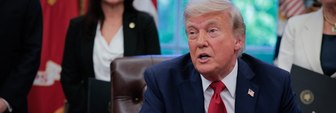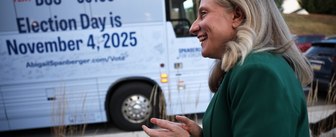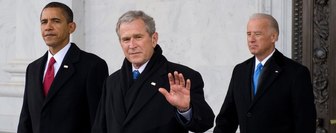Hello, I'm Will Jordan and welcome to the Pulse.
Sorting through a tumultuous couple of weeks on the campaign trail
Where do things stand?
National polls released after the Labor Day weekend suggested a tightening was taking place in the presidential race. Since then a number of state polls confirmed the slump, including polls showing Hillary Clinton down by several points in Ohio and Florida. What’s unclear is whether this is just a rut for the Clinton campaign, or a new equilibrium that will hold out through November, or the beginning of a slide into underdog status. But her position looks suddenly shakier than Obama’s in 2012 – his lead in Ohio, for example was small but much more consistent than Clinton’s is at this stage. The latest YouGov/CBS poll of 13 competitive states – polled as a group – finds the race tied in those states. Obama won the same group of states by two points in 2012, with 50% to Mitt Romney’s 48%.
A secondary question is whether a perception of a closer race will help Clinton win back voters who do not want a Trump presidency, but have so far assumed they can avoid one without voting for Clinton. Always, campaigns must deal with a push-pull between building support and avoiding complacency; as Vox’s Matt Yglesias recently pointed out, that could be a particularly large problem for an unpopular candidate like Clinton.
How much does Clinton’s “deplorables” remark matter?
Two events over the past week or two looked like they might damage Clinton: her remark that half of Trump’s voters belonged in a “basket of deplorables”, and her pneumonia spell. I would be skeptical that any single remark or event would have a major impact on the race. While many were quick to compare Clinton’s “deplorables” comment to Romney’s “47%” gaffe, the importance of the latter is probably overstated. Beyond that, “deplorables” could have countervailing effects: while the Trump campaign might try to turn it into a rallying cry, it might also resonate with certain quarters of the Democratic base (in a poll YouGov conducted in August, 77% of African-Americans, 60% of Hispanics and 67% of under-30s said Trump had probably or definitely tried to win the support of “white nationalists and racists”). Nevertheless, there is still an unusually large number of voters who have yet to throw their support behind Clinton or Trump, which might mean incidents like this matter more than in 2012.
What about that “health scare”?
Here we also have conflicting information. YouGov has asked about Clinton’s health before, and found that the share of the public who say Clinton is in a good enough physical condition to serve for four years as president fell dramatically from 52% pre-pneumonia to 39% post-pneumonia. If anything, the combination of the two negative Clinton stories may, together, have pushed the momentum towards Trump. One of the peculiar aspects of this race is that Clinton seems to do better when the attention is on Trump, and vice versa. Tracking data from Gallup shows people started hearing more Clinton-related news than Trump-related news right around the time Clinton’s numbers waned. So long as the prevailing narrative about each candidate is about how they deal with their negative images, attention will tend to be of the negative sort. That said, polling conducted after the incident has suggested Clinton's numbers are holding up.
So… why did Trump start talking about “birtherism” again?
There’s an interesting question, and one that has a fairly straightforward answer: Trump’s campaign aides thought the “racist” label was hurting him, and the Republican’s “birther” crusade, first launched in 2011, was part of that. They are probably correct. In last week’s YouGov/Economist Poll (conducted before Trump announced his reversal on the issue) 61% of registered voters thought Trump believed that Obama was born outside of the United States. Elsewhere in the poll, 51% described Donald Trump as “racist”. The view is especially common among groups where Trump has struggled relative to other Republican candidates, including African-Americans (73% say he is racist), Hispanics (77%) and whites with a college degree (54%). However, the question remains whether Trump’s press event last Friday – in which he supplanted the birther falsehood with another falsehood about the Clinton campaign’s role in spreading the rumor – will work in his favor.
What’s next?
The debates, mainly. The presidential debates, the first of which takes place next Monday, September 26th, provide one of the final set-pieces of the campaign and will likely help to decide the tone of coverage heading into the final stages of the race. In the past, debates have had a negligible effect on the race – even Obama’s famously bad performance at the first debate in 2012 arguably only returned the campaign to the status quo. An ABC News analysis finds that, out of 11 presidential debates since 1960, only the 1980 debate where Ronald Reagan asked voters "are you better off?" led to a significant shift in the polls. However, with minor party candidates Gary Johnson and Jill Stein excluded from the debates (they didn’t poll highly enough), and with an unusually high number of voters uncommitted to the major party candidates, the 2016 debates could prove especially important for Clinton and Trump.
The Pulse is a weekly newsletter YouGov has launched ahead of the 2016 primaries and general election to give readers a one-stop-shop for the latest polling-related news from the campaign. In addition to YouGov’s own extensive coverage of the election, The Pulse gives you the five things you need to know about the state of the campaign each week.









